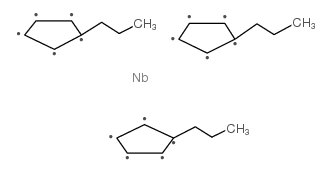69021-85-8
| 中文名 | 三(异丙基环戊二烯)钕(III) |
|---|---|
| 英文名 | tris(isopropylcyclopentadienyl)neodymium |
| 中文别名 | 三(异丙基环戊二烯)化钕(III) |
| 英文别名 |
TRIS(I-PROPYLCYCLOPENTADIENYL)NEODYMIUM
Tris(isopropylcyclopentadienyl)neodym MFCD00145483 Tris(i-propylcyclopentadienyl)neodym TRIS(I-PROPYLCYCLOPENTADIENYL)NEODYMIUM(-ND)(REO) TrisipropylcyclopentadienylneodymiumREOpurplesolid Tris(i-propylcyclopentadienyl)neodyMiuM(III) Tris(isopropylcyclopentadienyl)neodymium(III) (REO) |
| 沸点 | 127.2ºCat 760 mmHg |
|---|---|
| 分子式 | C24H33Nb |
| 分子量 | 414.42500 |
| 闪点 | >230 °F |
| 精确质量 | 414.16500 |
| LogP | 6.57540 |
| 储存条件 | 存放在充有干爽惰性气体的容器内,并放在阴凉,干爽处。储存的地方远离水源,氧化剂。远离空气,卤素存放。 |
| 稳定性 | 远离氧化物,空气,水分/潮湿,卤素。 |
| 计算化学 | 1、 疏水参数计算参考值(XlogP): 2、 氢键供体数量: 3、 氢键受体数量: 4、 可旋转化学键数量: 5、 拓扑分子极性表面积(TPSA): 6、 重原子数量: 7、 表面电荷: 8、 复杂度: 9、 同位素原子数量:0 10、 确定原子立构中心数量:0 11、 不确定原子立构中心数量:0 12、 确定化学键立构中心数量:0 13、 不确定化学键立构中心数量:0 14、 共价键单元数量:1 |
| 更多 | 1. 性状:蓝紫色晶体。 2. 密度(g/mL,25/4℃):未确定 3. 相对蒸汽密度(g/mL,空气=1):未确定 4. 熔点(ºC):未确定 5. 沸点(ºC,常压):未确定 6. 沸点(ºC,5.2kPa):未确定 7. 折射率:未确定 8. 闪点(ºC):>110 9. 比旋光度(º):未确定 10. 自燃点或引燃温度(ºC):未确定 11. 蒸气压(kPa,25ºC):未确定 12. 饱和蒸气压(kPa,60ºC):未确定 13. 燃烧热(KJ/mol):未确定 14. 临界温度(ºC):未确定 15. 临界压力(KPa):未确定 16. 油水(辛醇/水)分配系数的对数值:未确定 17. 爆炸上限(%,V/V):未确定 18. 爆炸下限(%,V/V):未确定 19. 溶解性:不能溶于水。 |
|
Section 1: Product Identification Chemical Name:Tris(i-propylcyclopentadienyl)neodymium (99.9%-Nd) (REO) CAS Registry Number:69021-85-8 Formula:(C3H7C5H4)3Nd EINECS Number:none Chemical Family:metallocene Synonym:Neodymium tri(i-propylcyclopentadienide)
Section 2: Composition and Information on Ingredients IngredientCAS NumberPercentACGIH (TWA)OSHA (PEL) Title Compound69021-85-8100%no datano data Section 3: Hazards Identification Emergency Overview:Irritating to the respiratory tract, skin and eyes. May be harmful if swallowed. Primary Routes of Exposure:Ingestion, inhalation Eye Contact:Causes slight to mild irritation of the eyes. Skin Contact:Causes slight to mild irritation of the skin. Inhalation:Irritating to skin, eyes and respiratory tract. Ingestion:No information available on the effects of ingestion. Acute Health Affects:Irritating to skin, eyes and respiratory tract. Chronic Health Affects:No information available on long-term chronic effects. NTP:No IARC:No OSHA:No SECTION 4: First Aid Measures Immediately flush the eyes with copious amounts of water for at least 10-15 minutes. A victim may need Eye Exposure: assistance in keeping their eye lids open. Get immediate medical attention. Wash the affected area with water. Remove contaminated clothes if necessary. Seek medical assistance if Skin Exposure: irritation persists. Remove the victim to fresh air. Closely monitor the victim for signs of respiratory problems, such as difficulty in Inhalation: breathing, coughing, wheezing or pain. In such cases seek immediate medical assistance. Seek medical attention immediately. Keep the victim calm. Give the victim water (only if conscious). Induce Ingestion: vomiting only if directed by medical personnel. SECTION 5: Fire Fighting Measures Flash Point:no data Autoignition Temperature:none Explosion Limits:none Extinguishing Medium:carbon dioxide or dry powder If this product is involved in a fire, firefighters should be equipped with NIOSH approved positive pressure Special Fire Fighting Procedures: self-contained breathing apparatus and full protective clothing. Hazardous Combustion andIf involved in a fire this material may emit toxic organic fumes. Decomposion Products: Unusual Fire or Explosion Hazards: No unusual fire or explosion hazards. SECTION 6: Accidental Release Measures Small spills can be mixed with vermiculite, sodium carbonate or other suitable non-combustible adsorbent and Spill and Leak Procedures: swept up. SECTION 7: Handling and Storage Store and handle the material under an inert atmosphere of dry nitrogen or argon. Keep away from heat, air Handling and Storage: and moisture. SECTION 8: Exposure Controls and Personal Protection Eye Protection:Always wear approved safety glasses when handling a chemical substance in the laboratory. Skin Protection:Wear appropriate chemical resistant gloves and protective clothing. Ventilation:Material may form a fine dust. If possible, handle the material in an efficient fume hood. If ventilation is not available a respirator should be worn. The use of respirators requires a Respiratory Respirator: Protection Program to be in compliance with 29 CFR 1910.134. Ventilation:Material may form a fine dust. If possible, handle the material in an efficient fume hood. Additional Protection:No additional protection required. SECTION 9: Physical and Chemical Properties Color and Form:purple solid Molecular Weight:465.77 Melting Point:no data Boiling Point:no data Vapor Pressure:no data Specific Gravity:no data Odor:none Solubility in Water:insoluble SECTION 10: Stability and Reactivity Stability:air sensitive, moisture sensitive Hazardous Polymerization:no hazardous polymerization Conditions to Avoid:Air and Moisture Incompatibility:halogens and oxidizing agents Decomposition Products:carbon monoxide, carbon dioxide, neodymium oxide and organic fumes. SECTION 11: Toxicological Information RTECS Data:No information available in the RTECS files. Carcinogenic Effects:no data available Mutagenic Effects:no data available Tetratogenic Effects:no data available SECTION 12: Ecological Information Ecological Information:No information available SECTION 13: Disposal Considerations Disposal:Dispose of according to local, state and federal regulations. SECTION 14: Transportation Shipping Name (CFR):Non-hazardous Hazard Class (CFR):NA Additional Hazard Class (CFR):NA Packaging Group (CFR):NA UN ID Number (CFR):NA Shipping Name (IATA):Non-hazardous Hazard Class (IATA):NA Additional Hazard Class (IATA):NA Packaging Group (IATA):NA UN ID Number (IATA):NA SECTION 15: Regulatory Information TSCA:Not listed in the TSCA inventory. SARA (Title 313):Title compound not listed. Second Ingredient:none SECTION 16 - ADDITIONAL INFORMATION N/A |
|
生态学数据: 通常对水是不危害的,若无政府许可,勿将材料排入周围环境。
|
| 危险品运输编码 | UN3181 |
|---|---|
| 包装等级 | III |
| 危险类别 | 4.1 |


